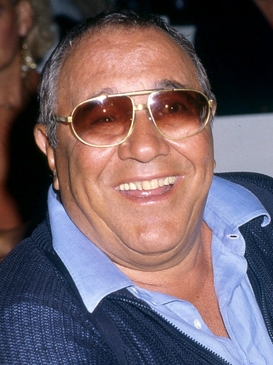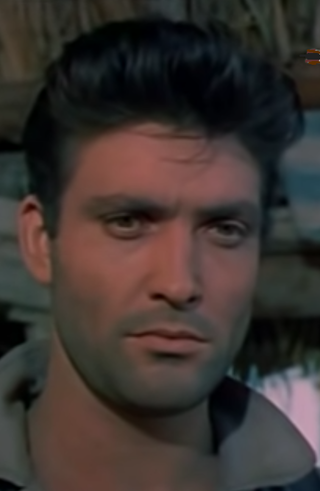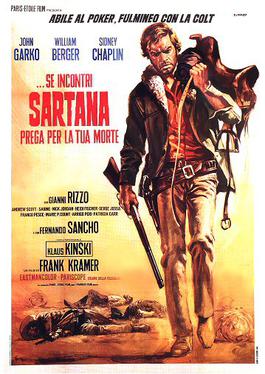Related Research Articles

The spaghetti Western is a broad subgenre of Western films produced in Europe. It emerged in the mid-1960s in the wake of Sergio Leone's film-making style and international box-office success. The term was used by foreign critics because most of these Westerns were produced and directed by Italians.

For a Few Dollars More is a 1965 Spaghetti Western film directed by Sergio Leone. It stars Clint Eastwood and Lee Van Cleef as bounty hunters and Gian Maria Volonté as the primary villain. German actor Klaus Kinski plays a supporting role as a secondary villain. The film was an international co-production between Italy, West Germany, and Spain. The film was released in the United States in 1967, and is the second part of what is commonly known as the Dollars Trilogy.
Mario Brega was an Italian character actor. His heavy build meant that he regularly portrayed a thug in his films, particularly earlier in his career in westerns. Later in his career, however, he featured in numerous Italian comedy films. Brega stood at 6 feet 4 inches (1.93 m) and well over 250 pounds (110 kg) at his heaviest but after the 1960s slimmed down significantly.

The Dollars Trilogy, also known as the Man with No Name Trilogy, is an Italian film series consisting of three Spaghetti Western films directed by Sergio Leone. The films are titled A Fistful of Dollars (1964), For a Few Dollars More (1965) and The Good, the Bad and the Ugly (1966). Their English versions were distributed by United Artists, while the Italian ones were distributed by Unidis and PEA.

Sergio Corbucci was an Italian film director, screenwriter and producer. He directed both very violent Spaghetti Westerns and bloodless Bud Spencer and Terence Hill action comedies.

Navajo Joe is a 1966 spaghetti Western film directed by Sergio Corbucci and starring Burt Reynolds as the titular Navajo Indian who opposes a group of bandits responsible for killing his tribe.

Giuliano Gemma was an Italian actor. He is best known internationally for his work in Spaghetti Westerns, particularly for his performances as the title character in Duccio Tessari's A Pistol for Ringo (1965), Captain Montgomery Brown/'Ringo' in Tessari's The Return of Ringo (1965), the title character in Michele Lupo's Arizona Colt (1966), Scott Mary in Tonino Valerii's Day of Anger (1967) and Michael "California" Random in Lupo's California (1977).
Alberto Grimaldi was an Italian film producer.

Benito Stefanelli was an Italian film actor, stuntman and weapons master who made over 60 appearances in film between 1955 and 1991.

Livio Lorenzon was an Italian actor who was mainly active during the 1950s and 1960s.

Rik Battaglia was an Italian film actor.

If You Meet Sartana Pray for Your Death is a 1968 Spaghetti Western film directed by Gianfranco Parolini. The film stars Gianni Garko, William Berger, Fernando Sancho and Klaus Kinski, and features a musical score by Piero Piccioni.

Adalberto Maria Merli is an Italian actor and voice actor.

Django is a fictional character who appears in a number of Spaghetti Western films. Originally played by Franco Nero in the 1966 Italian film of the same name by Sergio Corbucci, he has appeared in 31 films since then. Especially outside of the genre's home country Italy, mainly Germany, countless releases have been retitled in the wake of the original film's enormous success.
Giuseppe Vari was an Italian film director, editor and screenwriter.

Django, Prepare a Coffin, alternatively titled Viva Django, is a 1968 Italian spaghetti Western film directed by Ferdinando Baldi. The film stars Terence Hill in the title role, which was previously played by Franco Nero in Sergio Corbucci's original film.

The musicarello is a film subgenre which emerged in Italy and which is characterised by the presence in main roles of young singers, already famous among their peers, and their new record album. In the films there are almost always tender and chaste love stories accompanied by the desire to have fun and dance without thoughts. Musicarelli reflect the desire and need for emancipation of young Italians, highlighting some generational frictions. The genre began in the late 1950s, and had its peak of production in the 1960s.

Pino Rucher was an Italian guitarist active in orchestral settings and in film soundtracks.
Sergio Pastore (1932-1987) was an Italian director and screenwriter best known for the giallo film Crimes of the Black Cat (1972).

Il fanciullo del West is a 1943 Italian comedy film directed by Giorgio Ferroni and starring Erminio Macario. It is named after Puccini's opera La fanciulla del West and is considered the first western parody in Italian cinema and the precursor of the Spaghetti Western genre.
References
- ↑ Zanacchi, Adriano (1969). Potenza e prepotenza della comunicazione sociale: Guida allo studio degli strumenti, dei metodi e dei problemi della comunicazione sociale (in Italian). Edizioni paoline.
- ↑ "Sergio Pastore". Archived from the original on 2015-10-16. Retrieved 30 January 2024.
- ↑ Weisser, Thomas (2005-09-05). Spaghetti Westerns--the Good, the Bad and the Violent: A Comprehensive, Illustrated Filmography of 558 Eurowesterns and Their Personnel, 1961-1977. McFarland. ISBN 978-0-7864-2442-9.
- ↑ Giusti, Marco (2007). Dizionario del western all'italiana (in Italian). Oscar Mondadori. ISBN 978-88-04-57277-0.
- 1 2 España, Rafael de (2002). Breve historia del western mediterráneo: la recreación europea de un mito americano (in Spanish). Glénat. ISBN 978-84-8449-280-1.
- ↑ Crisantemi per un branco di carogne (in Italian), retrieved 2024-02-29
- ↑ Stemmer, Michael (1996). Western Movie Composers: A Selected, Annotated Listing of 2006 Genre Films Shown in Germany. Wiesjahn. ISBN 978-3-931610-03-6.
- ↑ "1968-1969". www.umiliani.eu. Retrieved 2024-03-01.
- ↑ "Crisantemi per un branco di carogne (lost Italian western film; 1967) - The Lost Media Wiki". lostmediawiki.com. Retrieved 2024-01-30.
- ↑ "original soundtrack - Crisantemi per un branco di carogne (CD) - (SOLD OUT) - Beat Records Company". www.beatrecords.it. Retrieved 2024-03-01.
- ↑ "Film Music Site - Crisantemi per un Branco di Carogne Colonna sonora". www.filmmusicsite.com (in Italian). Retrieved 2024-03-01.